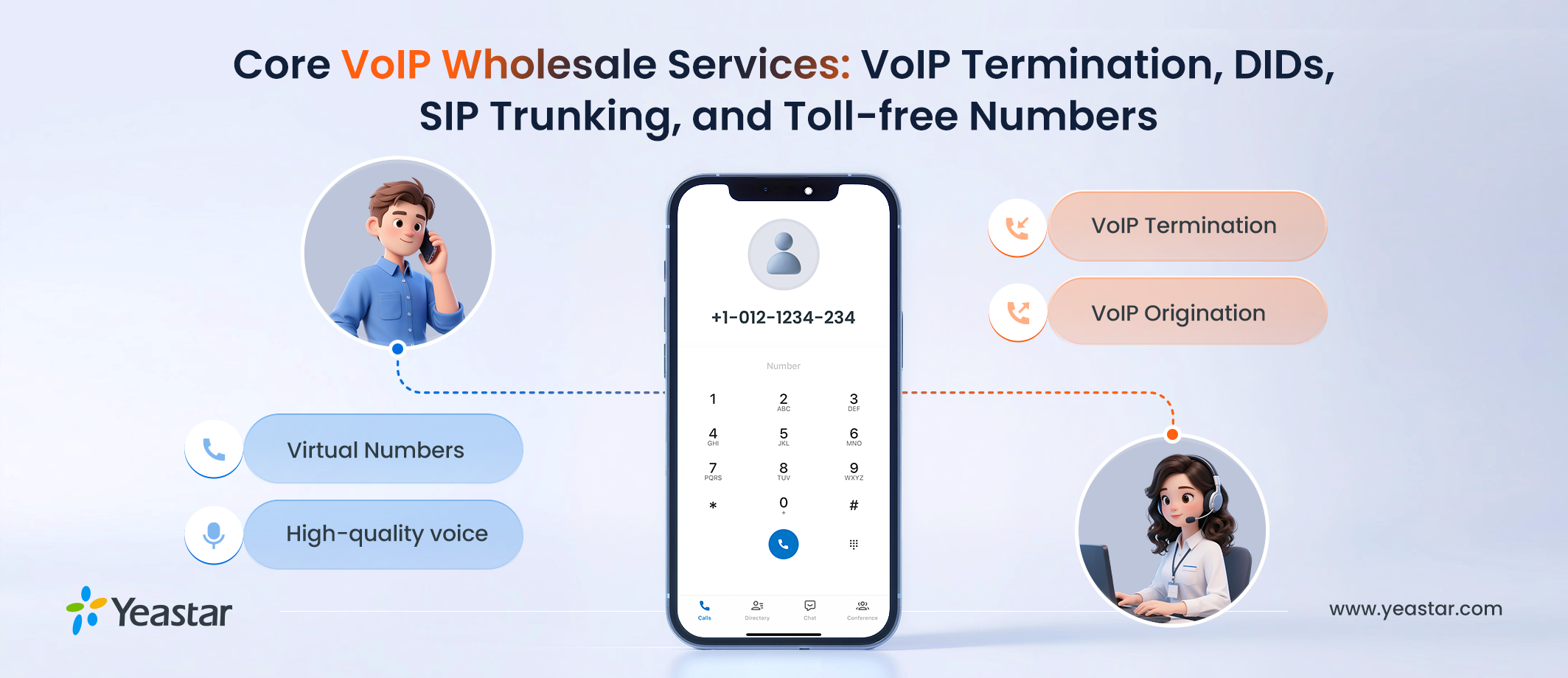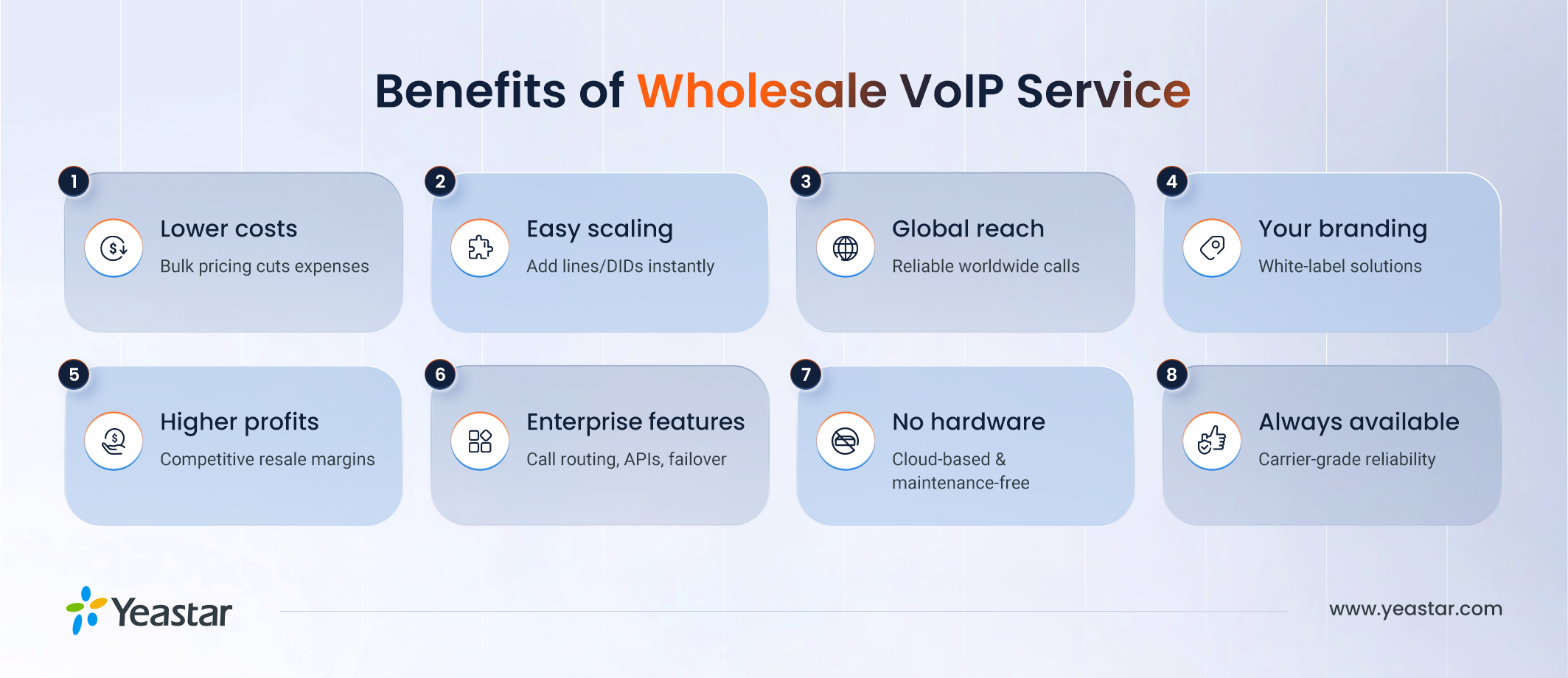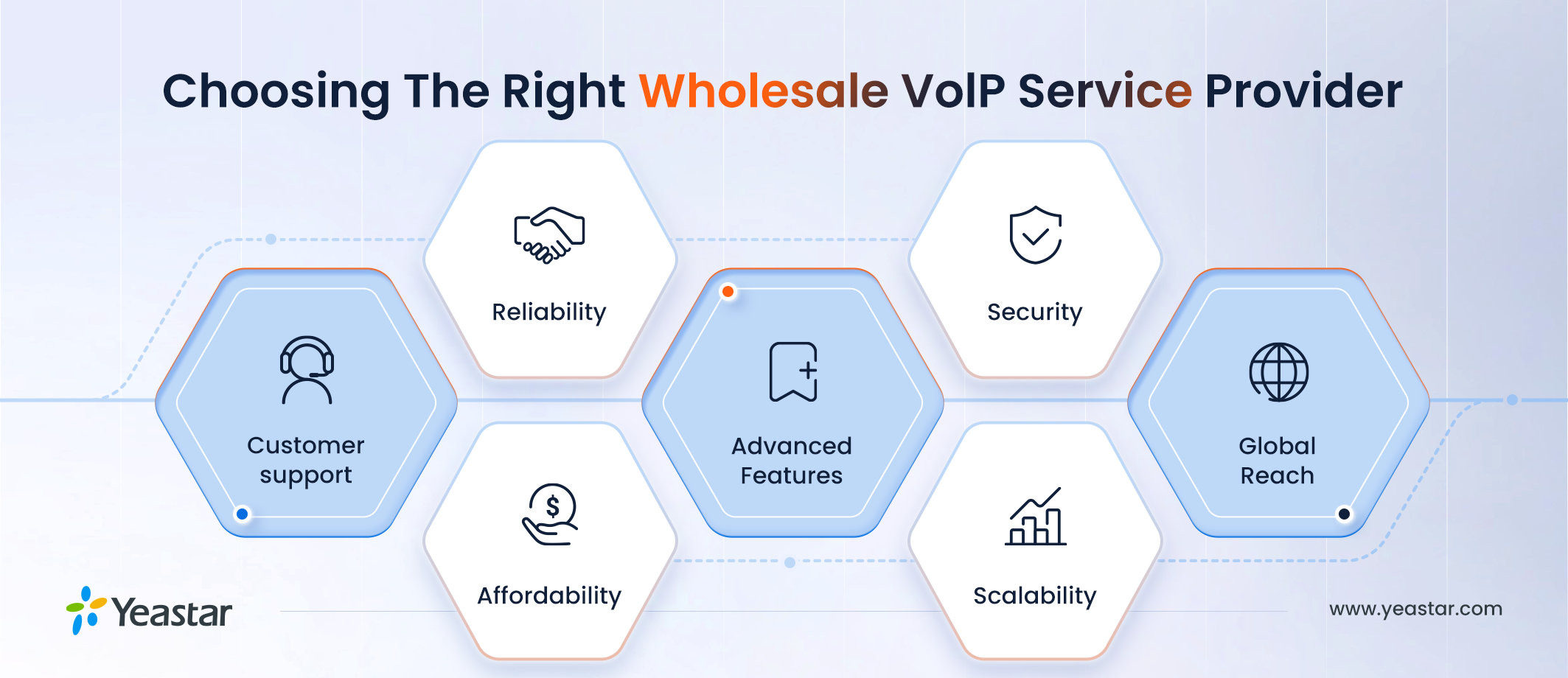Wholesale VoIP Services: A Reseller’s Guide to Choosing the Right Provider in 2025
6.7 min read
Wholesale VoIP is revolutionizing business communications by delivering bulk, cost-effective voice services without compromising quality. For managed service providers (MSPs), internet telephony service providers (ITSPs), and telecom resellers, partnering with the right wholesale VoIP provider is critical to scaling offerings and boosting profitability.
But with countless providers in the market, what truly matters when selecting a partner in 2025? This guide breaks down the key factors, even for non-technical resellers, to help you make informed, profit-driven decisions.
Table of Contents
- What is wholesale VoIP? →
- What are the core service in VoIP wholesale? →
- Why wholesale VoIP services matter today? →
- How to choose the best wholesale VoIP provider? →
- Common FAQs about the VoIP wholesale →
Defining Wholesale VoIP
Wholesale VoIP refers to the bulk purchase and sale of voice communication services over IP networks instead of traditional phone lines. In essence, it involves buying large volumes of call minutes, SIP trunks (call routes), or phone numbers (DIDs) from a wholesale VoIP provider at significantly discounted rates.
Unlike retail VoIP providers, wholesale VoIP providers typically do not serve end-users directly. Instead, they supply resellers (ITSPs, MSPs, telecom carriers, and call centers), who then rebrand and resell these services to businesses under their own name.
This model allows Internet Telephony Service Providers (ITSPs), call centers, telecom operators, and large enterprises to:
- Offer retail VoIP services to their customers with added margins.
- Manage high-volume communication needs cost-effectively, with scalability and high call quality.
By leveraging wholesale VoIP, resellers can expand their service portfolios while maintaining competitive pricing, reliability, and flexibility — key advantages in today’s cloud communications market.
Core VoIP Wholesale Services: VoIP Termination, SIP Trunking, and Virtual Numbers

VoIP Termination
VoIP termination routes outbound calls between networks using IP-based carriers. It ensures reliable call completion to global destinations. The service supports both CLI and non-CLI routing options. CLI routes maintain caller identification for brand consistency. Non-CLI routes optimize costs for high-volume traffic.
VoIP Origination (DIDs/Virtual Numbers)
VoIP origination provides virtual phone numbers that route calls through internet protocols rather than physical lines. These Direct Inward Dialing (DID) numbers enable businesses to establish local presence globally. The service offers immediate access to numbers across multiple countries and regions.
SIP Trunking
SIP Trunking enables private branch exchange (PBX) systems to connect to the PSTN via internet protocols, replacing traditional phone lines. This cloud-based solution delivers voice services through virtual connections instead of physical circuits, offering significant cost savings and streamlined management.
Toll-Free Numbers Service
Toll-free numbers enable customers to contact businesses at no cost, with the call charges being covered by the business instead. These numbers support inbound calls from specific regions or countries while maintaining a professional business image.
Why Wholesale VoIP Services Matter in Today’s Digital Economy
Wholesale VoIP powers modern global communications. As businesses go digital, they need voice services that work worldwide without compromising quality or flexibility. This is where wholesale VoIP delivers — giving providers and enterprises enterprise-grade voice without the cost and complexity of traditional systems.
For service providers, it’s a game-changer. MSPs, ITSPs and carriers can now offer reliable global voice services without building expensive infrastructure.

Instant Scalability, Zero Infrastructure
Wholesale VoIP eliminates costly hardware dependencies, slashes operational overhead, and enables instant scalability — whether supporting a surge in call volume or expanding into new markets. No upfront capital, no stranded capacity — just on-demand voice that grows with your business.
Carrier-Grade Quality Built In
Modern wholesale VoIP delivers carrier-grade uptime, HD voice, and built-in redundancy, ensuring your customers get flawless connectivity. And with remote work and global teams here to stay, the demand for flexible, cloud-based telephony has never been higher.
Your Growth Accelerator
The right wholesale partner doesn’t just supply minutes — they fuel growth. By offloading infrastructure burdens, providers can focus on innovation, customer experience, and scaling their core offerings.
How to Choose the Best Wholesale VoIP Provider: 7 Key Considerations

Selecting the right wholesale VoIP partner is critical for telecom resellers and service providers looking to deliver reliable, scalable, and profitable voice solutions. Here’s what to prioritize:
#1 Tier-1 Carrier Direct Access
Top-tier providers operate on direct Tier-1 carrier networks, ensuring global reach, minimal latency, and maximum uptime. This eliminates complex SIP trunk routing hassles, letting you focus on sales while guaranteeing enterprise-grade call quality. A strong backbone also means smoother dispute resolution, refunds, and customer support — keeping your end users satisfied.
#2 White-Label & Brand Control
Your brand should dominate the customer experience — not your provider’s. Look for full white-label solutions, including customizable invoices, dial tones, and portals. This strengthens brand loyalty and prevents your clients from knowing (or caring) who your upstream partner is.
#3 Future-Proof Features & Seamless Integrations
Your provider must offer essential VoIP features (DIDs, call routing, IVR, etc.) alongside advanced capabilities (APIs, UCaaS integrations, AI-driven analytics). Seamless compatibility with your existing tools ensures smoother operations and happier customers. Plus, continuous innovation keeps you competitive as demands evolve.
#4 Cost Efficiency Without Compromise
While bulk VoIP pricing beats traditional telephony, the cheapest option isn’t always the best. Balance affordability with enterprise-grade SLAs, automated billing, tax compliance tools, and profit-friendly margins. Flexible, usage-based pricing helps you scale sustainably.
#5 A True Partner, Not Just a Supplier
The best providers go beyond connectivity — they support your growth. Expect 24/7 technical help, dedicated account managers, partner onboarding, and training resources. A strategic ally will help you optimize pricing, troubleshoot efficiently, and expand strategically.
#6 Scalability for Long-Term Growth
With the VoIP/UCaaS market surging fast, your provider must scale effortlessly — whether you’re adding users, expanding globally, or integrating new services. Avoid providers that lock you into rigid plans.
#7 User-Friendly Management & Billing Tools
A robust SIP trunking platform should include real-time analytics, automated billing, and easy-to-use dashboards. These tools reduce administrative overhead, streamline invoicing, and give your clients a seamless self-service experience.
The ideal wholesale VoIP provider removes complexity while maximizing your profitability and control. By prioritizing network quality, branding, scalability, and partnership support, you’ll secure a solution that grows and profits with your business.

